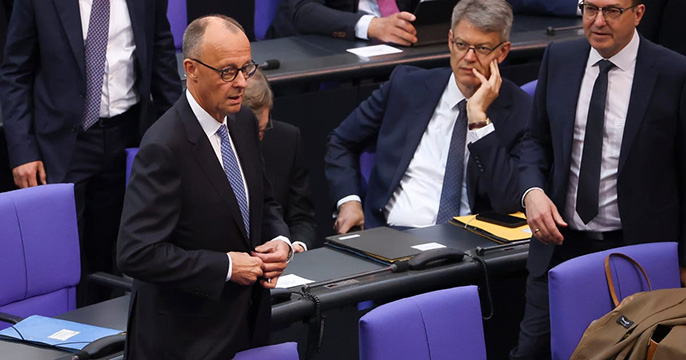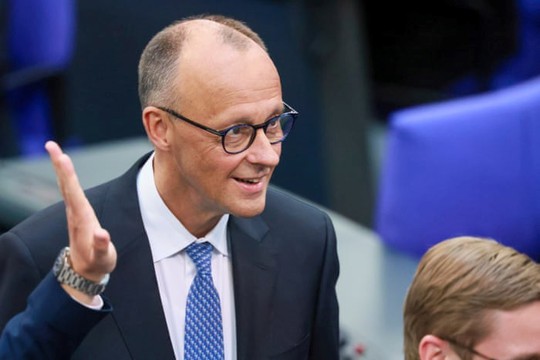Friedrich Merz. Winner… at last
Photo: The Guardian
Conservative leader Friedrich Merz has won a parliament vote to become Germany's next chancellor at the second attempt, BBC informs.
Merz had initially fallen six votes short of the absolute majority he needed on Tuesday morning – a significant blow to his prestige and an unprecedented failure in post-war German history.
As it was a secret ballot in the 630-seat Bundestag, there was no indication who had refused to back him – whether MPs from his centre-left coalition partner or his own conservatives.
After hours of uncertainty in the Bundestag, the parties and the president of the Bundestag agreed to hold a second vote, which Merz then won with 325 votes, a majority of nine.
His coalition with the Social Democrats should have had enough seats in parliament from the start, with 328 MPs in total, but it appears 18 of them dissented during the first vote.
No chancellor candidate has lost a Bundestag vote in the 76 years since democracy was restored in Germany in 1949, and there was a prevailing mood of confusion in parliament in the hours after the vote.
A total debacle had been averted, declared one German news website.
Merz's defeat had been seen by political commentators as a humiliation, possibly inflicted by a handful of disaffected members of the Social Democrat SPD, which signed a coalition deal with his conservatives on Monday.
Not everyone in the SPD was happy with the coalition deal, but party officials were adamant their party was fully committed to it.
"It was a secret vote so nobody knows," senior Social Democrat MP Ralf Stegner told the BBC, "but I can tell you I don't have the slightest impression that our parliamentary group wouldn't have known our responsibility."
Right party Alternative for Germany, which came second in the February election with 20.8% of the vote, seized on Merz's initial failure and called for fresh elections.
Joint leader Alice Weidel wrote that the vote showed "the weak foundation on which the small coalition has been built between the [conservatives] and SPD, which was rejected by voters".
Political correspondents in the Bundestag said Merz's initial shock result indicated that even if the coalition did come to power eventually, there was a potential issue lurking within its ranks.
Despite having a narrow majority of 12 seats, the agreement between the conservatives and centre left was seen as far more stable than the so-called traffic-light coalition of three parties which fell apart last November in a row over debt spending.
 Friedrich Merz was confused after the first round of voting. The deputies do not want to see him as a chancellor.
Friedrich Merz was confused after the first round of voting. The deputies do not want to see him as a chancellor.
Photo: DPA
Friedrich Merz’s dramatic German parliament defeat in a vote to make him chancellor is yet more evidence of the fragility of his incoming government, POLITICO notes.
Merz was six votes short of the 316 MPs he needed to become chancellor in Tuesday’s secret Bundestag ballot after the first round of voting.
Merz won the Feb. 23 election and has since been trying to cobble together a coalition with the center-left Social Democrats (SPD). Merz’s campaign promises included pledges to improve relations with Germany’s neighbors, and to take a more proactive position on the European stage.
Observers said it was likely the parliament defeat ― which should have been a formality ― arises from MPs from Merz’s own ranks not voting for him. However, for a new chancellor to fail to win enough parliamentary votes to endorse him is unprecedented in Germany’s postwar history.
…The statements of the leader of the German Christian Democratic Union (CDU) Friedrich Merz do not signal a desire to normalize relations with Russia. This was announced on May 5 by Kremlin spokesman Dmitry Peskov.
"We have heard a number of statements that he (Merz. — Ed.) has been doing so far. These statements did not signal his desire and willingness to follow the path of normalization of bilateral relations between the Federal Republic and the Russian Federation," Peskov said at a briefing, answering a question from Izvestia about Russia's willingness to work with the new German authorities.
According to him, Moscow will be guided by the words and, above all, the actions of the new chancellor.
read more in our Telegram-channel https://t.me/The_International_Affairs

 11:23 07.05.2025 •
11:23 07.05.2025 •























